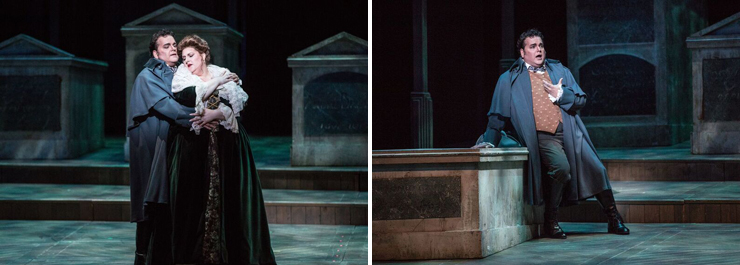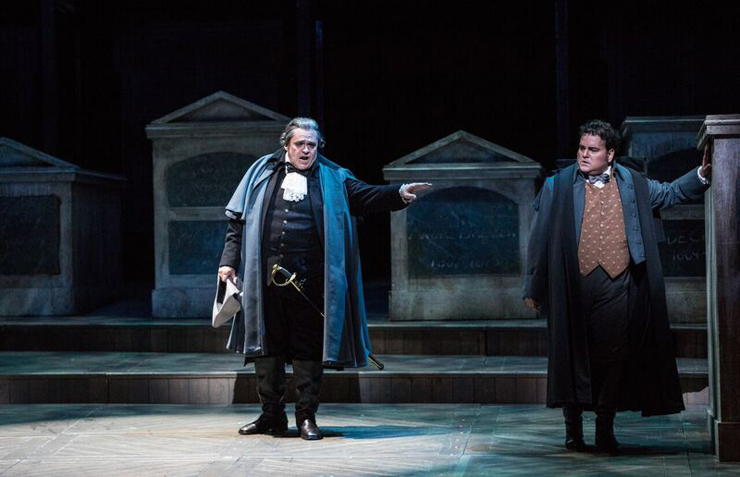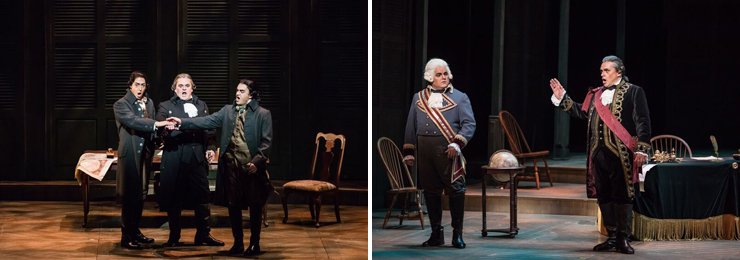
LEFT: Calvin Griffin as Ribbing and Alex Soare as Horn. RIGHT: Dana Beth Miller as Ulrica # 2. Photo credit: Brittany Mazzurco.
Assassinations of political figures have dotted the world’s historical landscape for centuries. One has only to recall Julius Caesar, Abraham Lincoln and Indira Gandhi,and other victims will quickly come to mind who were murdered because of a politically motivated conspiracy.
King Gustav III of Sweden was one such misfortunate, who, in 1792, was shot while attending a masked ballroom dance. The challenge was to figure out who was who? Potent grist for a playwright’s mill.

LEFT: Dana Beth Miller as Ulrica. RIGHT: Elena Galvan as Oscar and Todd Thomas as Anckarstrom.Photo credit: Brittany Mazzurco.
Giuseppe Verdi, having recently come off a trifecta with “Rigoletto,” “Iltrovatore” and “La traviata,” was commissioned for a new opera and was on the lookout for a big story in want of a big score. He located what he was looking for in Daniel Auber's earlier opera about the Swedish king’s assassination, “Gustave III, ou Le bal masque” with a libretto by Eugène Scribe. Librettist Antonio Somma was enlisted to join Verdi in the project.
The creation of their opera turned out to be itself operatic in scope.

LEFT: Elena Galvan as Oscar. RIGHT: Finale with Tamara Wilson, Elena Galvan, Rafael Davlia.Photo credit: Brittany Mazzurco.
It was not uncommon for the authorities in Europe to place constraints on artists creating material for the theater. The recent assassination attempt on Napoleon III and jitters in other European royal houses during Verdi’s time caused the Italian censors to insist that Verdi and Somma make sweeping rewrites to their work-in-progress, including changing the protagonist from a monarch to a lessor station, thus avoiding a staged regicide.
Changing the names of the characters and shifting the conceit from a financially motivated political conspiracy to an act of jealousy wasn’t enough. Relocating the action to colonial Boston (the king became the governor, etc.) was necessary before the censors would greenlight “Ballo’s” Roman premier.
On opening night, Saturday, April 29, at the Arsht Center, Florida Grand Opera followed the 20th century performance trend which has restored “Ballo’s” original physiology, featuring its Stockholm setting and historical characters.
The speedy libretto drives the love triangle between Gustavo, the King of Sweden, his love interest, Amelia, and his secretary and close friend, Count Anckarström, Amelia’s husband.
The web of intrigue requires players who have the stamina to sing and act in a sustained muscular way without going over the top vocally and dramatically. FGO found three such players in tenor Rafael Davila, soprano Tamara Wilson and baritone Todd Thomas.

LEFT: Rafael Davila and Tamara Wilson. RIGHT: Rafael Davila as Gustavo. Photo credit: Brittany Mazzurco.
Davila (who was tapped for his Metropolitan Opera debut as Don José in "Carmen" shortly after playing the same role in FGO’s production last fall) essayed King Gustavo with an enlightened, strong and nuanced sensibility. His earthy tenor may lack the polish of some singers, but that contributes to the unique quality of his voice, penetrating, rich and beefy.
Davila effectively laced power with joy at seeing Amelia’s name on the guest list for his masked ball (“La rivedrà nell'estasi”), contrasting bravado and fearlessness while awaiting his fortune to be told by the enchantress Ulrica, declaring that nothing could sway him from the sea and the woman he loves (“Di' tu se fedele”). Amusingly for the latter aria, the male chorus strummed their canes like air guitars in accompaniment.
Davila again soared convincingly with sorrow while contemplating his misguided love (“Ma se m'è forza perderti”), signing his own sacrifice, the order to send Amelia and Anckarström back to England, honestly revealing the ache of love about to be lost.
Bravas were abundant for Wilson taking her demanding turn as the conflicted Amelia. A recipient of the notable Richard Tucker Award, Wilson possesses an instrument that is as supple as it is expansive. In the part, her control was elegant, as forceful as it could be delicate. She would go soft and pure and penetratingly immense with equal calm.
For her tour de force scene at the gallows to gather herbs for a potion to mitigate her feelings for Gustavo (“Ma dall'arido stelo divulsa”), Wilson and a solo English horn effectually captured the melancholy. Wilson’s soprano was full of dimension, deftly turning the sadness to fear, rising into her high notes with power and emotion, returning to reflection beautifully.

LEFT: Tamara Wilson and Todd Thomas. RIGHT: Tamara Wilson as Amelia. Photo credit: Brittany Mazzurco.
The love duet between Wilson and Davila on the gallows hill was another highlight with their voices intertwining atop Verdi’s shimmering melody; the walls and the audience appeared to vibrate as the pair blended their money notes.
Wilson employed her considerable range while pleading with Anckarström to be allowed to hold her son one more time before he carried out his plan to murder her for her apparent infidelity (“Morrò, ma prima in grazia”). Her acting chops rang true as she dramatically turned to plead her case: “Do not refuse the pleas of a mother’s heart,” her soft demeanor communicating real emotion, her voice and character, well drawn and confident as she lashed out into her high notes. Wilson covered every nuance and dynamic in her register.
Thomas, a commanding presence as Scarpia in FGO’s last production of "Tosca," played Count Anckarström (first devoted advisor to Gustavo, then enraged husband to Amelia) with a finely tuned baritone. Warning Gustavo of a mounting conspiracy against him and the need for him to be careful for the sake of his country’s well-being, Thomas delivered the concern with a strong clarion voice (“Alla vita che t'arride”).
Once convinced of his wife’s unfaithfulness, Anckarström decides that Gustavo should pay for the crime of infidelity rather than Amelia (“Eri tu che macchiavi quell'anima”). Dramatically charged, Thomas’s plangent voice shook the house, his ominous stage presence and vocal prowess brought the bravos.
Two cameos were of note.
Mezzo-soprano Dana Beth Miller, showing her opposite side (having played the vulnerable young priestess Adalgisa in FGO’s last production of "Norma") easily slipped into the role of the sorceress Ulrica. She had the moves and officious pipes to plausibly summon the King of the Abyss to do his bidding (“Re dell'abisso, affrettati”). Miller’s remarkable chest and head voice was devoid of an edge. Her articulation was as rich as her facility for tone and character; her dramatic gestures and robust voice left the audience captivated and engaged.

Todd Thomas as Anckarstrom and Rafael Davila as Gustavo. Photo credit: Brittany Mazzurco.
In the trouser role of Oscar, the king's lighthearted page, was soprano Elena Galván, who previously scored points as Norina in FGO's production of "Don Pasquale." She defended Ulrica (“Volta la terrea”) with crisp and supple Mozartian vocal leaps and energy, later darting from chair to chair with her sparkling soprano, taunting Anckarström as to the exact description of the king’s costume at the ball (“Saper vorreste”).
Supporting roles belonged to the two schemers – Count Ribbing and Count Horn – basses Calvin Griffin and Alex Soare, as well as tenor Benjamin Werley as the judge/Amelia's servant, and bass Nicholas J. Ward as the sailor Cristiano.
Marco Pelle, in his FGO directorial debut, rendered his vision of the betrayal and faithfulness, actions and reactions, choosing believability over the allure of melodrama.
Reliable conductor Ramon Tebar navigated Verdi’s vigorous score skillfully and sublimely, drawing the passion out of the romantic drama and the suspense out of the supernatural elements. Between Act 1 and Act 2, Tebar adroitly moved the orchestra from lovely melody to foreboding with Verdi’s signature change up.
Verdi’s melodic and rhythmic passages took the listener by surprise and just as quickly, returned to a soft motif. The big chords and heaving waves heard in Ulrica’s cave instantly contrasted with light winds and a charming melody. The theatrical device of the small wind band continuing to play a minuet after the king was shot, then slowly dropping off as the gravity of the situation gripped the musicians, remained most effective.
Chorus master Katherine Kozak marshaled the phalanx of officers, townspeople and guests at the ball. Voices blended wonderfully during the rich choral melody claiming, “power is corrupt if it does not serve the people” and in the hymn-like chorus to save the king’s soul, swelling as only Verdi can swell it.

LEFT: Calvin Griffin with Todd Thomas and Alex Soare. RIGHT: Rafael Davila with Todd Thomas. Photo credit: Daniel Azoulay.
A wrought iron two-story gallery framing the playing area, including the government assembly room, Ulrica’s cave, a cemetery, the home office of Count Anckarstrom and finally the palace ballroom, was the nifty work of set designer Eric Fielding, enhanced by the lighting design of Kevin G. Myatt, creating the lightning bolts and mossy floor of the cave and marble floor of the ballroom.
Howard Tsvi Kaplan and Sue Schaefer teamed up to outfit the players in late 18th century fashion and powdered wigs. Men sported knee britches, long waistcoats long-sleeve shirts with slim cravats and frock coats; women in floor-length gowns in muted colors, Ulrica in brightly colored gypsy garb and Amelia, bejeweled in a peach colored ballroom dress. Various Cloaks and masks were not only worn in the final scene but by several guests in the audience as well!
"Un ballo in maschera (A Masked Ball)."
By Giuseppe Verdi; libretto by Antonio Somma; conductor, Ramon Tebar; stage director, Marco Pelle; production, Utah Opera; sets by Eric Fielding; lighting by Kevin G. Mynatt; costumes by Howard Tsvi Kaplan; wig and make-up by Sue Schaefer; chorus master, Katherine Kozak; assistant conductor, Lance Inouye; production stage manager, Liam Roche; FGO general director, Susan T. Danis; projected English titles by Karl W. Hesser; projected Spanish titles by Dreambay Enterprises; audio description by the Arsht Audio Description Volunteer Team.
Cast: Gustavo - Rafael Davila (April 29, May 2, 6, 11) and Jonathan Burton (April 30, May 5, 13), Amelia - Tamara Wilson (April 29, May 2, 6, 11) and Alexandra LoBianco (April 30, May 5, 13), Count Anckarström - Todd Thomas, Ulrica - Dana Beth Miller, Oscar - Elena Galvan, Count Ribbing - Calvin Griffin, Count Horn - Alex Soare, A Judge/Amelia's Servant - Benjamin Werley, Cristiano - Nicholas J. Ward.

LEFT: Tamara Wilson as Amelia and Todd Thomas as Anckarstrom. RIGHT: The shooting of Gustavo. Photo credit: Daniel Azoulay.
Remaining schedule | Un ballo in maschera
Sung without amplification in Italian with projected titles in English and Spanish.
Miami Adrienne Arsht Center / Ziff Ballet Opera House
- May 5, 6, 2017 at 8 p.m.
Fort Lauderdale Broward Center for the Performing Arts / Au-Rene Theater
- May 11, 13, 2017 at 7:30 p.m.
Audio Description is available without charge for blind and visually impaired patrons attending Arsht Center operas and Broadway shows.
Ticket purchases can be made online at www.FGO.org or by phone at FGO’s Box Office (800) 740-1010.




